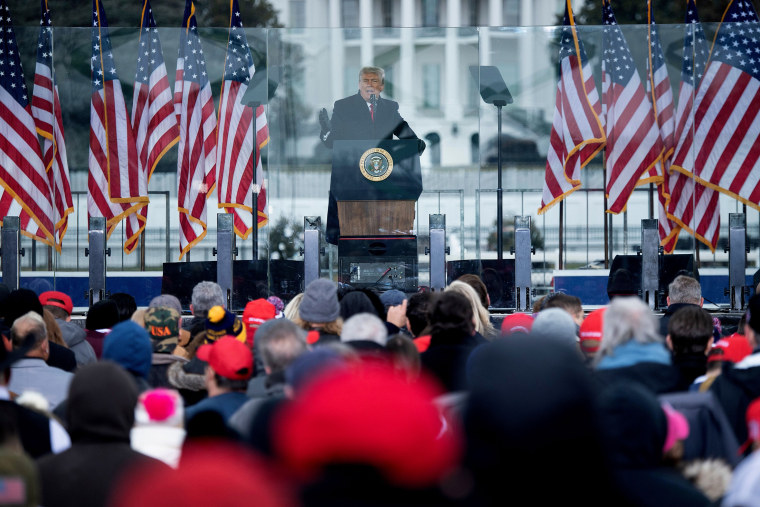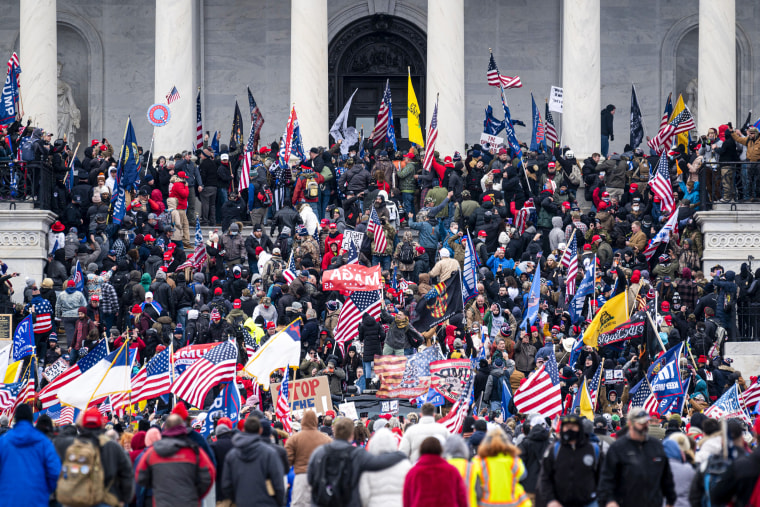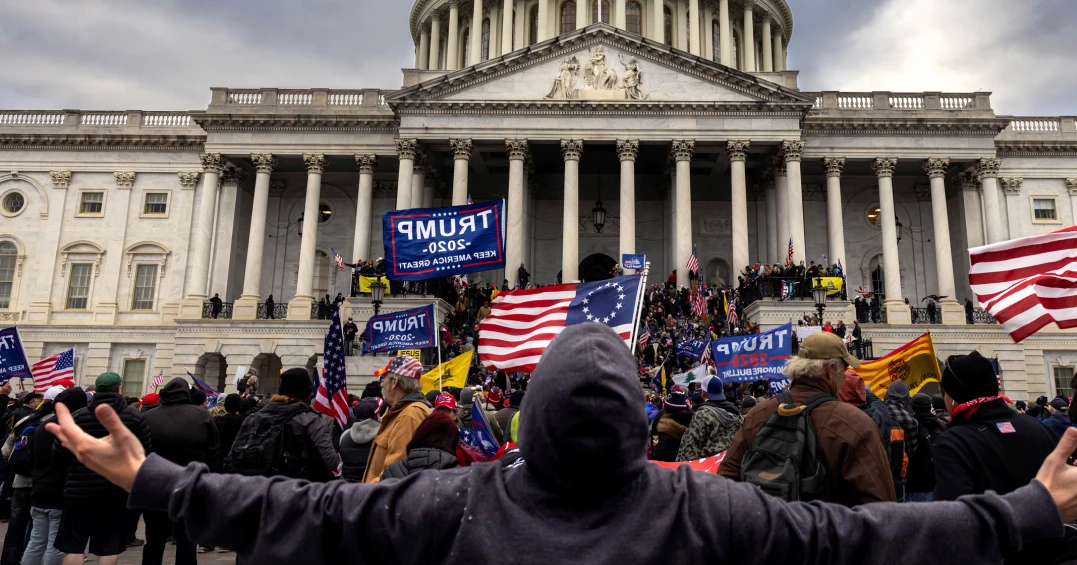WASHINGTON — President Donald Trump’s decision to pardon virtually every person charged in connection with the Jan. 6, 2021, attack on the U.S. Capitol was made at the last minute as the inauguration approached — and it surprised some of his supporters and aides.
“He is who he is,” a person who worked on Trump’s transition team told NBC News. “Expectations are sometimes set as best as can be expected, and sometimes they change quickly.”
Two officials who worked on Trump’s transition said the decision to do a sweeping pardon was made just days before the inauguration. They, like others interviewed for this article, were granted anonymity to share details of private discussions.
Follow live politics updates here
While Trump had long promised pardons for many, if not most, of those convicted of nonviolent crimes on Jan. 6, he had been less clear about how he would handle those found guilty of violent offenses, including 169 people who pleaded guilty to assaulting police officers.
Trump decided to go about as far as he could, issuing roughly 1,500 pardons and commuting the sentences for 14 others.
The pardons surprised many in large part because Trump and Vice President JD Vance had signaled recently that the president would take a more surgical approach.
“I don’t know what the staff work was like on that,” former House Speaker Newt Gingrich, R-Ga., a Trump ally who attended Monday’s inauguration, said in an interview.
Drawing a line that would have denied pardons to people who attacked police “is a more defensible position and easier to support,” Gingrich added. “You have to wonder whether you really want to put people back on the street who haven’t paid their dues for having done those things.”
The White House did not return requests for comment.

President Donald Trump spoke to supporters at a rally before some of them stormed the U.S. Capitol on Jan. 6, 2021.Brendan Smialowski / AFP – Getty Images file
Trump defended his decision at a news conference Tuesday evening. Asked by NBC News about his pardon of a man who plunged a stun gun into the neck of a police officer during the attack, Trump at first was unsure whether he had pardoned or commuted his sentence.
When told it was a pardon, the president replied: “We’ll take a look at everything. But I can say this, murderers today are not even charged. You have murders that aren’t charged all over.”
“These people have already served years in prison and they’ve served them viciously,” he added. “It’s a disgusting prison. It’s been horrible. It’s inhumane. It’s been a terrible, terrible thing.”
Trump made freeing Jan. 6 participants a central campaign promise last year, referring to the prisoners as “hostages” and playing a song at his rallies performed by inmates known as the J6 Choir. But Trump and his campaign team also at times promised nuance in how he would determine who would be eligible for pardons, indicating that violence could be a deal-breaker.
In an interview in December with NBC News’ “Meet the Press,” Trump reiterated that he wanted to do pardons on Day 1, but that there “may be some exceptions … if somebody was radical, crazy.”
“I’m going to do case-by-case, and if they were nonviolent, I think they’ve been greatly punished,” Trump told Time magazine in an interview that month. “And the answer is, I will be doing that, yeah, I’m going to look if there’s some that really were out of control.”
Vance was more direct in a Jan. 12 interview on “Fox News Sunday,” saying, “If you committed violence on that day, obviously you shouldn’t be pardoned.” On Tuesday, Vance’s press secretary Taylor Van Kirk said the case-by-case basis that Trump and Vance had talked about “meant there was always going to be a large degree of gray area” in how the pardons were executed.
“Due to the corrupt process of these prosecutions, President Trump rightly decided to grant a broad pardon to all wrongfully convicted of January 6 protesters,” Van Kirk wrote to NBC News.
Referring to former President Joe Biden’s last-minute pardons before leaving office Monday, Van Kirk added that “the outgoing administration’s application of presidential pardons for members of the Biden family are far more deserving of additional media scrutiny.”
A Republican close to the Trump administration who has spoken to Vance about the issue pointed to the vice president’s long public stance in support of Jan. 6 defendants, noting that he helped raise money for them and their families as a Senate candidate in 2022.
“His support for these people dates back at least two-and-a-half years,” this person said. “I don’t think anything switched up. He’s been pretty clear there’s a gray area, but he’s also always from the beginning been pushing for mass commutations.”
Once Trump’s decision was made for “leniency,” one of the transition officials told NBC News, the entire nascent administration, including Vance, quickly got on the same page. Behind the scenes, Vance pushed for broad pardons and commutations, another person familiar with his role said.
“Everyone has been clear that we were looking at all the cases and the ultimate decision, which the Vice President ended up being a driving force behind, was more encompassing action,” the second transition official wrote to NBC News. “The President ended up airing on leniency given how political and broken the process was.”
Alex Bruesewitz, a GOP political consultant with close ties to Trump world who was subpoenaed to testify before the House’s Jan. 6 committee, said there was little doubt Trump would take sweeping action early in his term.
“It was the right thing to do,” he said. “Some on the left may disagree, but the process was the punishment.”
The move was also overwhelmingly backed by Trump’s MAGA political base, many of whom descended on Washington over the past few days for his inauguration.
Brett Thomas, 52, said he had “tears coming out of my eyes” when he attended Trump’s rally at Capital One Arena on Monday and heard the president say he would pardon the Jan. 6 defendants.
Thomas, the president of Rhino Web Studios in New Orleans, was at Capitol on Jan. 6, but did not go in because his wife called him and told him to go back to his hotel, he said.
Although he supported Trump’s decision, he said he does see a difference between people who walked into the Capitol and those who fought with the cops on that day. Still, he believes they all had been punished enough.
“If there is proof that you assaulted a police officer, there needs to be consequences,” Thomas said. “Not if they have been sitting in jail for years, that’s their consequence. And as far as I am concerned, time served.”

Trump pardoned roughly 1,500 of his supporters who were charged in the Jan. 6 attack.Bill Clark / CQ-Roll Call via Getty Images file
Mike Davis, a Trump ally and legal adviser who had publicly lobbied the president to go big on pardons, said Trump felt something of a kindred spirit with his supporters who were Jan. 6 prisoners because he had also been prosecuted by the government.
“Trump has been on the receiving end of Joe Biden’s politicized and weaponized justice department,” he said. “But Trump is a billionaire former and future president who had the resources to weather it. These Jan. 6th defendants do not.”
Davis also said that Biden’s own pardons on his way out of office — which included members of his family — and his commuting the death sentences of 37 federal inmates on death row to life in prison, gave Trump the political cover he needed to use the pardon power as he saw fit.
“Joe Biden pardoned his family,” Davis said. “He freed child rapists and murderers from death row, and he pardoned a monster who murdered two FBI agents,” Davis said, referring to Native American activist Leonard Peltier, who has long maintained his innocence and had his life sentence commuted. “I don’t want to see Democrats’ fake tears about Trump’s pardons.”
“They can go to hell,” he added.
The Trump decision, though, is not without tense criticism. Michael Fanone, the former police officer who had a stun gun driven into his neck and was among those badly injured during the Jan. 6 attacks, told NBC News the pardons were “outrageous” but “shouldn’t come as a surprise to any American.”
“The rule of law is dead in this country. We are now in the age of government lawlessness,” Fanone said.
Fanone suffered a heart attack and traumatic brain injury as a result of the attack and was among the officers who testified before the House select committee tasked with investigating the Jan. 6 attack. Biden also issued pre-emptive pardons to committee members, which include current and former members of Congress, out of fear Trump would try to go after them when he returned to office.
Current and former prosecutors also sharply criticized Trump’s pardons, with one person who worked on the Jan. 6 cases calling them “appalling.”
While some Republican lawmakers cheered Trump’s actions, a number of Republican senators were less enthusiastic, outright saying they disagreed or simply refusing to embrace them.
“I just can’t agree,” Sen. Thom Tillis, R-N.C., said.
Sen. Josh Hawley, R-Mo. — who was photographed pumping his fist at Trump supporters before they stormed the Capitol on Jan. 6 — said he would not have pardoned people who committed violent offenses but noted that Trump “keeps his campaign promises.”
Jonathan Allen, Peter Nicholas, Ryan J. Reilly, Scott Wong, Frank Thorp V, Kate Santaliz, Katie Taylor and Kyle Stewart contributed.



